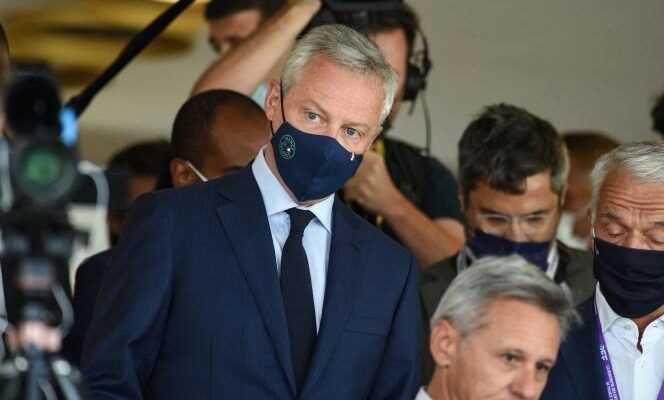It was the government’s watchword since the start of the health crisis. The “whatever the cost” – namely the support of all economic sectors by the State – is now well and truly ” finished “, announced the Minister of the Economy, Bruno Le Maire, Wednesday, August 25, on the occasion of the Meeting of entrepreneurs of France organized by the Medef.
During the health crisis, “We didn’t count public money, because it was responsible for doing it. But now that the French economy is restarting, that we have 6% growth prospects, “whatever the cost”, it’s over ”, said Mr. Le Maire. “We have gone to tailor-made, we will continue to support those who need it”, he added in front of the bosses gathered at the Parisian racecourse of Longchamp.
Sectoral aid maintained
“I give them an appointment next Monday, August 30: the world of culture, restaurant owners, hotels, bars, the world of tourism, tour operators”, said Mr. Le Maire about the meeting to be held in Bercy and decide to maintain certain aid to companies linked to the health crisis beyond August 31. “We will look at those who have lost turnover during this health crisis, during this month of health passes, and we will help those who have lost money because of health regulations”, promised the minister.
“But for the rest, let the economy be free, let it create jobs and wealth without the support of the state!” “, launched the minister, echoing the words of the president of Medef, Geoffroy Roux de Bézieux. “We are not entrepreneurs to live off state aid”, declared Mr. Roux de Bézieux, also asking for‘”Stop the’ whatever the cost ‘”. And to add: “It is time for the state to return to its rightful place. “
The executives of Guadeloupe and Martinique ask for “adjustments” to aid
Earlier in the day, Ary Chalus, president of the regional council of Guadeloupe, and Serge Letchimy, president of the territorial collectivity of Martinique, had written to the prime minister, Jean Castex, to ask “Adaptations of existing systems” to avoid “The collapse of island economies”.
On Wednesday, the confinement and curfew, in effect since July 30, were extended until September 19 in Martinique; the start of the school year has been postponed to September 13 for all the Antilles. “After two years of crisis, the economic actors of our two islands share the same observations”, write the two presidents, who enumerate their difficulties to “Honor the deadlines as well as their charges (…), to collect aid “, but also “The inadequacy of certain devices with their needs”. They also point to the chain consequences of stopping the activity of certain sectors on “Others who are related to them”. To avoid “The social disaster” of the Martinican and Guadeloupe economies, the two executives are therefore asking the government to “Maintenance of the solidarity fund until the end of the crisis for all sectors of activity”. They also hope ” suspension “ certain conditions of access to this fund, recalling that “80% of local economies are very small businesses”, of which more than 50% are debtors to Urssaf, in Guadeloupe.
At the beginning of August, the government decided to“Adapt the emergency economic aid measures put in place to protect overseas companies from the effects of the Covid-19 crisis”. Businesses administratively closed for more than twenty-one days per month (compared to thirty days so far) and showing more than 20% loss of turnover have thus been able to benefit from the “reinforced” solidarity fund (20% of the turnover). business within the limit of 200,000 euros).
Companies in so-called “protected” sectors (tourism, events, culture, sports and leisure, hotel and catering, transport, in particular, and the activities which depend on it) subject to a state of emergency for more than twenty-one days in August were also able to benefit from the “reinforced” solidarity fund under the same conditions as for the month of June, i.e. up to 40% of their loss in turnover (against 20% in the other territories). ), within the limit of 20% of their turnover and 200,000 euros.
